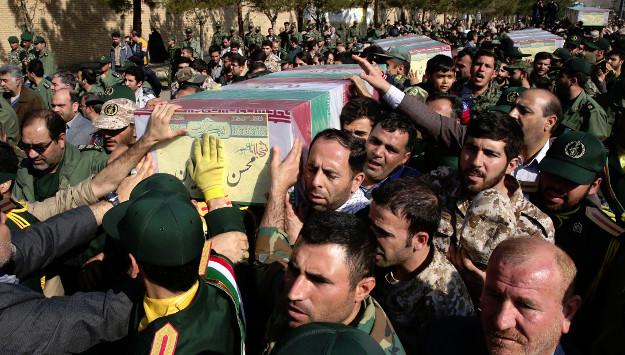On November 30, hundreds of people gathered in the Iranian city of Qom to attend the funeral procession of several Afghan and Pakistani Shiites killed in Syria.
The latest high-profile ceremony in Iran for those killed in the Syrian conflict is part of the Islamic Republic’s efforts to encourage foreign volunteers to fight alongside the forces of embattled Syrian President Bashar al-Assad. As the fighting in the strategic Syrian city of Aleppo is raging on, some reports suggest that the Islamic Revolution Guards Corps (IRGC) has redoubled its recruitment drive of Afghan and Pakistani Shiites. On November 22, a senior Iranian official admitted that more than 1,000 combatants dispatched by Iran to fight in Syria had been killed in the past years. The news prompted Afghanistan’s Senate to call for an investigation into Iran’s role in the killing of Afghans in Syria.
While some of these recruits join the Syrian battlefield on religious grounds, others do so for financial and other incentives provided by the Iranian government. To attract more recruits, for example, the Iranian parliament passed a law earlier this year, granting citizenship to the family members of those killed in Syria. Other incentives reportedly include a monthly salary of several hundred dollars and reduced sentences for those in Iranian prisons.
The Iranian recruitment of Afghan and Pakistani Shiites not only adds fuel to the sectarian violence in the Arab world, but it also threatens to inflame already growing sectarian tension in Pakistan and disturb Sunni-Shiite harmony in neighboring Afghanistan.
Pakistan has experienced decades of sectarian strife and sectarian killings across the country is on the rise. While much of the sectarian violence in Pakistan has been committed by extremist Sunni groups, there are signs of a growing backlash from the country's Shiite minority. Last month, Pakistani authorities arrested a top Shiite cleric and dozens of others for alleged involvement in sectarian killings.
In addition, the Islamic State is growing its presence and activity in South Asia, and together with its regional allies, it has carried out several attacks against Shiites in Afghanistan and Pakistan. Thus, the return of battle-hardened fighters from Syria indoctrinated in sectarian beliefs in future could add another layer of instability in Afghanistan and Pakistan.


